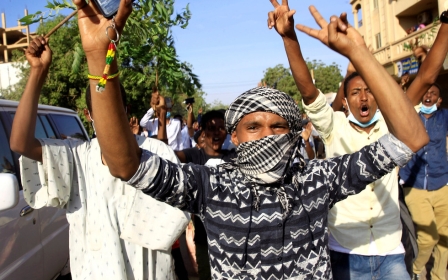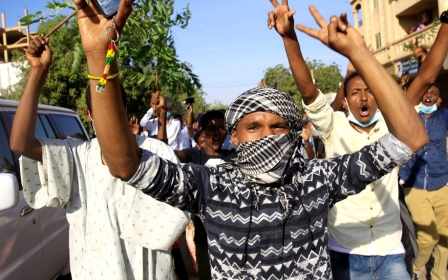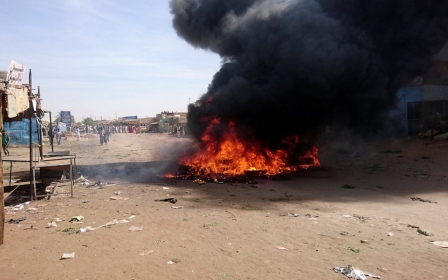Sudan security forces fire stun grenades at hundreds of worshippers near capital
Sudanese security forces have fired tear gas and stun grenades at hundreds of worshippers as they left a mosque near the capital Khartoum, according to witnesses, after opposition groups called for widespread anti-government protests to continue across the country.
Activists had urged protesters to gather in large numbers following weekly prayers on Friday and protests were held in several cities across Sudan.
Hundreds of worshippers emerged from the mosque in Khartoum's twin city of Omdurman on the west bank of the Nile to protest, but police fired tear gas to disperse the crowd, witnesses said.
People exiting the mosque had chanted "peaceful, peaceful" before they were attacked by the police, a witness told Reuters news agency.
Around 30 SUVs belonging to security forces had surrounded the square outside the building before noon prayers.
Witnesses told AFP news agency that protests were also staged in Port Sudan, Madani and Atbara - the eastern Sudanese city where the first demonstrations erupted on 19 December against an increase in living costs.
The witnesses said several of the demonstrations were later broken up by anti-riot police.
More protests urged
The protests came as opposition groups called for more anti-government rallies to be held over the next few days.
A group of opposition parties met late on Thursday and agreed to "push for more protests" in the coming days, the Sudanese Communist Party said in a statement.
The opposition Sudanese Congress Party said that a few hours after protests began on Friday its chief Omar el-Digeir was arrested by security agents.
"He has been taken to an unknown location," the party said in a statement.
The Sudanese Writers' Association also said that well known poet Mohamed Taha had also been arrested on Tuesday after he participated in a protest in Khartoum. "We don't know his whereabouts," the association said.
On Thursday, Sudan said that 19 people including two security personnel had been killed so far in bread price protests since they first erupted in towns and villages and later spread to Khartoum.
Amnesty International said on Tuesday that at least 37 people had died.
UN Secretary-General Antonio Guterres on Friday called on authorities in Sudan to investigate deaths during violent protests in Khartoum and other cities.
Guterres "appeals for calm and restraint and calls on the authorities to conduct a thorough investigation into the deaths and violence," a UN spokesman said in a statement.
Civil society groups said authorities arrested nine opposition figures on Thursday evening ahead of the planned demonstrations.
Sudan has been rocked by more than a week of anti-government protests sparked by rising prices, shortages of basic commodities and a cash crisis.
The head of the media office at the National Intelligence and Security Service denied knowledge of Thursday's arrests.
A committee of professional organisations involved in the protests said in a statement that authorities had raided a meeting of opposition leaders in Khartoum.
The nine people they had detained included Siddiq Youssef, a senior leader of Sudan's Communist Party, as well as leaders from the pan-Arab Baath and Nasserist parties, the statement said.
Fourteen leaders of one of Sudan's two main opposition groupings were detained last Saturday and then released hours later.
Economic crisis
Sudan has been gripped by a deep economic crisis that began in 2011 after the southern half of the country voted to secede, taking with it three-quarters of the country's oil output, and has been aggravated by years of overspending and mismanagement.
Opposition groups blame President Omar al-Bashir, who has governed Sudan since 1989, for the mismanagement.
A series of measures, including a sharp devaluation of the Sudanese pound in October, have failed to shore up the economy.
In January, Sudan was shaken by demonstrations triggered by high bread prices.
But the protests that began on 19 December appear to be more serious.
Authorities have shuttered schools and declared curfews and states of emergency in several regions, and residents say police have used tear gas and sometimes live ammunition against demonstrators.
Putting the death toll at 19, Sudan's information minister on Thursday blamed some of the deaths on scuffles between shopowners and what he described as looters.
He said 219 civilians and 187 members of the security forces had been wounded.
Journalists at the daily al-Sudani said one of their colleagues was beaten by security forces after protesters passed next to the independent newspaper's offices.
New MEE newsletter: Jerusalem Dispatch
Sign up to get the latest insights and analysis on Israel-Palestine, alongside Turkey Unpacked and other MEE newsletters
Middle East Eye delivers independent and unrivalled coverage and analysis of the Middle East, North Africa and beyond. To learn more about republishing this content and the associated fees, please fill out this form. More about MEE can be found here.




